Equality Now releases the trailer of Asia’s first fiction film on FGM/C, directed by Sahiyo co-founder, Insia Dariwala
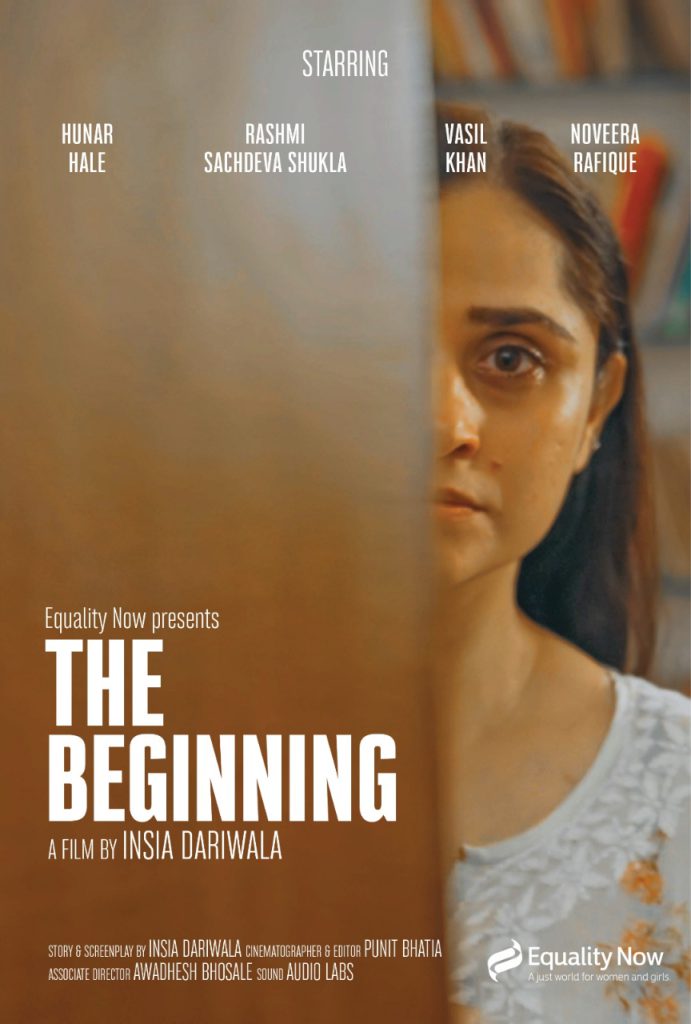
On International Day of Zero Tolerance for Female Genital Mutilation, Equality Now — an NGO that advocates for the rights and protection of women and girls around the world — released the trailer for “The Beginning.” Written and directed by Sahiyo’s co-founder Insia Dariwala, it’s the Asian continent’s first ever fiction film on Female Genital Mutilation/ Cutting (FGM/C). Inspired by real survivors who underwent FGM/C as little girls, the film highlights the trauma many struggled with, long after the cut. Equality Now’s Global Leader, Divya Srinivasan, who worked with Insia on producing the film said, “We believe that this thought-provoking piece evocatively demonstrates the struggles faced by a woman holding the dual experiences of being a survivor herself, while also being a mother who is expected to play a major role in continuing the practice with future generations.” She also writes, “Since survivors of FGM/C in India broke the silence about this practice over seven years ago, there have been great strides towards prevention and eradication of FGM/C. The issue of FGM/C in India has been recognised in the Supreme Court and at international bodies; and there is greater awareness on the patriarchal nature and harmful effects of the practice within practicing communities, particularly amongst the younger generation. However, we have a long way to go in the struggle to end FGM/C and we need more public conversations to change hearts and minds of all stakeholders, and prevention and response initiatives to ensure that we can move towards the goal of eradication.In partnership with Insia and Sahiyo, we hope that we can use this film to raise awareness on FGM/C in the country, particularly with young people; and to highlight FGM/C as a priority human rights issue that needs to be addressed by a range of stakeholders including the international community, medical associations, and CSOs working on ending gender-based violence in India.”
In the Name of Your Daughter: A film for change
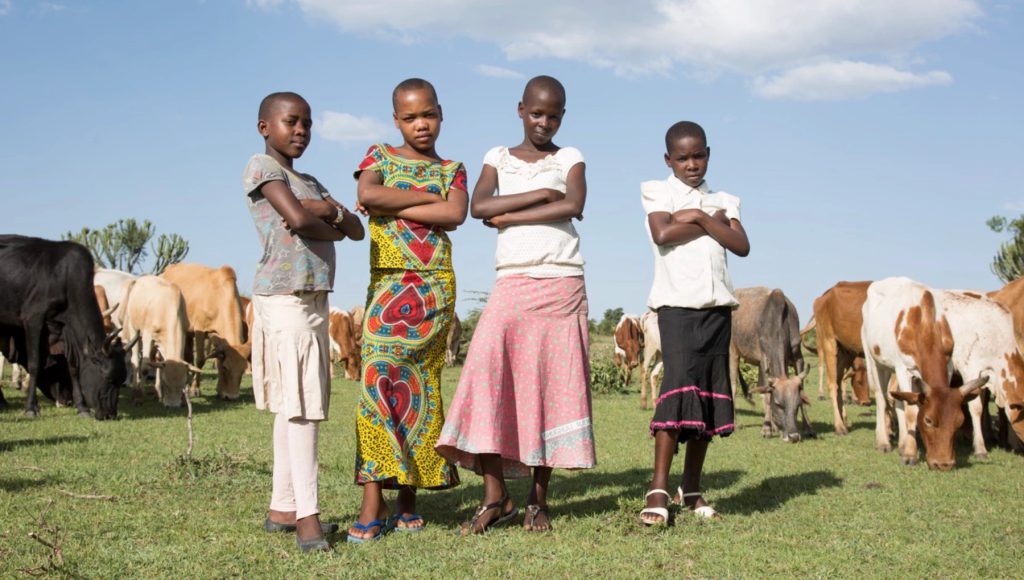
By Sandra Yu Healthy Tomorrow hosted a film screening and panel discussion of In the Name of Your Daughter, filmed and directed by Giselle Portenier and released in 2018. The featured speakers of the panel last fall were Portenier, herself, and Susan McLucas, founder of Healthy Tomorrow. Healthy Tomorrow (in partnership with Sini Sanuman) is a U.S.-based group that actively works to stop female genital cutting (FGC) in Mali. A notable Sahiyo volunteer and former programs intern, Hunter Kessous, was involved in the event planning, as well. The documentary is a deeply intimate piece about young girls in Tanzania who bear the societal pressure to undergo FGC. Following the stories of several young girls in Tanzania and a charismatic African activist, Rhobi Samwelly, the audience is taken on an emotional journey into the heartbreaking circumstances in which daughters flee their families to escape FGC and their planned child marriages. For me, the topic of FGC was not unfamiliar, but I had always read medical analyses and journal articles that characterized the girls’ bodies by their body parts. To watch the film and hear firsthand from filmmaker Portenier and activist Susan McLucas was eye-opening. I believe the film succeeded beyond expectations. In the highly divisive rhetoric of anti-FGC activists against cultural traditionalists, Portenier presents the complexities of fighting against an ingrained tradition in detail. Most notably, she wedges parental authority against legal authority. In one scene, the school authorities and police receive notice that parents are preparing for cutting season, the summer months of June, July, and August when thousands of girls in Tanzania undergo FGC from traditional community cutters. Gathered in a small classroom, the local police, schoolteachers, and activists face off with parents. They go head-to-head, arguing about who has the authority to determine their fates. Tears flow, and it is a heartbreaking scene; the parents must decide between a heavily ingrained cultural tradition and the wellbeing of their daughters, while the young girls decide whether they can trust their very own families. [youtube url=”https://youtu.be/xt3XdU0Fddo”] The second front that I believe Portenier succeeds on is to elicit a heart-wrenching response from the audience on behalf of the young girls. She presents a heart-wrenching juxtaposition between the girls’ perceived social roles and their own autonomous dreams. In the initial scenes, we are taken with Samwelly to a community market as she asks men about their beliefs regarding marriage, FGC, and women. One man pointed to the cows surrounding them and commented. “A cut girl is worth ten to twelve cows,” he said. “An uncut girl is worth six cows, sometimes less.” Another man chimed in, “I am an entrepreneur,” he said. “My business comes from selling cloths and items for the ceremonies. If you stop FGC, you are infringing on my rights as an entrepreneur.” Throughout the film, young girls are constantly compared to their marriage value or dowry worth in cows, and criticized for promiscuity or uncleanliness. In the last scene, we see a montage of young girls, each with a dream. One wants to become a doctor, another an aerospace pilot. As Portenier commented in the panel discussion after the screening, a human rights perspective is needed in fighting FGC above all else. When the girls realize their autonomy and impact of FGC on their bodies, they instinctively flee because it is an infringement upon their human rights. On that note, Portenier makes the violence of the tradition crystal clear. In the film, she juxtaposes the stunning Tanzanian landscape, fields extending far past what the eye can see, with the intense night-time raids, as police rescue girls about to undergo FGC and arrest parents and cutters. Beyond the immediate physiological and psychological trauma, young girls that undergo FGC may hemorrhage or bleed heavily to the point of death. Long-lasting effects include problems with childbirth, pain during sexual intercourse, and sexual dysfunction. Additionally, arresting parents may not be effective for long-term change, as it is not to the benefit of the child in many cases and the girls will likely still be cut. Immediate family members can oversee the cutting without parental permission or in the case of the parents’ imprisonment. By the end of the film, the audience is left heartbroken for the young girls, forced to make a life-changing decision between their families and their autonomy. Portenier ends on a positive note, highlighting Rhobi’s incredible work, including the Safe House built to house runaway girls. I do wish that she touched more on the relationship between FGC, traditions, and religion, as well as the growing medicalization trend of FGC being performed by healthcare providers. However, in the 1 hour and 25 minutes, In the Name of Your Daughter does a phenomenal job of drawing in and mobilizing the audience. After the film screening, McLucas and Portenier discussed the impact of COVID-19 on activists’ efforts. The situation has worsened as families are selling daughters off into marriage at larger numbers due to the economic crisis in Tanzania. While the activists’ previous strategy involved law enforcement, largely through school involvement and night raids, the families have adapted. Cutting season comprises a full year potentially and schools are closed, leaving many girls vulnerable to the tradition. McLucas, whose work is focused on ending FGC in Mali, lamented that it is increasingly difficult to investigate potential cuttings. However, her organization’s strategy now focuses primarily on ensuring that uncut women gain value within their own societies. The task is daunting, to change the minds of a generation and more, but the activists in Tanzania are making an impact. The Safehouse, developed by Samwelly, has saved more than 300 girls so far, and continues to house girls in their time of need. To learn more about FGC in Tanzania: https://www.unfpa.org/news/girls-escaping-fgm-rural-tanzania-crowdsourced-maps-show-way-safety https://tanzania.unfpa.org/en/publications/fact-sheet-fgm-united-republic-tanzania About the film: Below is Rhobi Samwelly speaking at a United Nations’ panel in 2018: [youtube url=”https://youtu.be/N7KCCkEnZ_U”]
Voices to End FGM/C
Voices to End FGM/C Voices to End FGM/C is mobilizing a critical mass of storytellers and activists from across the globe by bringing people together to share and heal from their experiences of female genital mutilation/cutting (FGM/C), connect and grow as leaders in their own communities, and create short videos calling for an end to this harmful practice. Watch all digital stories View Program Overview History & Impact Voices to End FGM/C is a joint digital storytelling project initiated by Sahiyo and Silence Speaks. In 2018, the two organizations launched their inaugural digital storytelling workshop, bringing together survivors of FGM/C living in the United States to surface their personal experiences with FGM/C. These nine women’s stories elevated the conversation on FGM/C in the U.S. and the stories have been widely shared through online platforms, screening events, and media articles. Initially called, Sahiyo Stories, the project has servedas an educational tool to discuss FGM/C amongst survivors and within practicing communities. Since 2018, Sahiyo has conducted 9 workshops under the now named Voices to End FGM/C project resulting in the creation of 88 videos that have collectively garnered over 120,000 views across our social media platforms. The Voices project is ultimately about breaking from deeply ingrained social norms by normalizing the voices of those who dare to speak publicly and openly about a harmful practice that for many communities is considered taboo to speak about openly and publicly. With storytelling comes a ripple effect, as one person’s story can inspire others to share their own. As more stories are shared, they contribute to bridging the data gap regarding the number of women and girls impacted by FGM/C globally. 9 Workshops 82 Participants from 19+ Countries 88 Videos 120,000+ views After taking part in our Voices program, 92% of our workshop participants have remained involved with our organization, serving as guest speakers in events and advisors on projects, such as our Critical Intersections Research and developing educational materials. Webinar Highlight: Youth Advocacy Against FGM/C: A Conversation on Change On November 4, 2024, Sahiyo hosted a webinar featuring dynamic youth advocates, including Voices alumni Umme Kulsoom Arif, Hunter Kessous, and Saza Faradilla, as well as Sahiyo volunteers Nur Bookwala and Atiqah Suhaimi. The webinar provided a safe and supportive platform for these young advocates to discuss their personal experiences in advocating against FGM/C and to share insights into how their advocacy efforts have evolved over time. Click HERE to watch the webinar. The map below highlights the countries represented by participants in the Voices to End FGM/C project, showcasing the global reach and diverse backgrounds of our storytellers. These stories have been used on a variety of platforms as educational material, serving not only communities that continue FGM/C but also aiding in the training of healthcare professionals to support survivors, government officials who can use policy to address FGM/C, and other service providers who might be able to support survivors and work towards prevention for future generations. Visit the Voices website to learn more about the project Explore our Voices Screening Guide to effectively use our digital stories for FGM/C advocacy and education and our Sharing Your Experience with FGM/C Guide to empower individuals and communities in sharing personal narratives. Voices to End FGM/C Podcast Voices to End FGM/C has grown to include more than 80 storytellers from 19+ countries. They came to our workshops and crafted powerful short videos … but so much was left unsaid. If you’re interested in hearing more from our storytellers and learning more about the medical and legal landscape for FGM/C in the U.S. and in other parts of the world, tune in now to our podcast. In six episodes ranging in length from 20-40 minutes each, Mariya and Amy talk with Voices digital storytelling participants about the complex familial, cultural, and political contexts of their stories. Some episodes bring in guests who have acted in their capacity as partners, therapists, public health professionals, and elected officials to speak out against FGM/C. If you’ve always wanted to know more about FGM/C, or if you’re wondering why, as a feminist or social justice activist, you should care about the topic, tune in now. All episodes are available on the Voices to End FGM/C website, as well as on Apple Podcasts and Spotify. Listen to Episode Zero below: Listen to more episodes Read about our Storytellers: Support our Voices to End FGM/C Program
‘A Pinch of Skin’ to Screen in Berlin
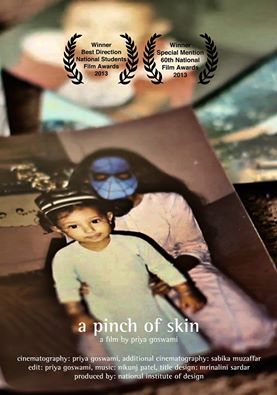
Sahiyo co-founder’s documentary ‘A Pinch of Skin’ will be screening at NaturFreudeJungend in Berlin on the 25th May. 25th May is also the one-year anniversary of the historic repealing of the ban on abortion in Ireland, also known as the 8th Amendment. This is especially significant as a successful contemporary feminist movement, where women of Ireland voted against the ban on abortion, influencing pro-choice ideas in the Irish constitution. Goswami will be joined by a pro-choice activist from Ireland, Dervla O’Malley and Dr. Tobe Levin von Gleichen, Female Genital Cutting/Mutilation activist, for a panel discussion post the screening. The discussion will aim to look at practices and cultural ideas such as Female Genital Cutting, stigma on abortion, menstruation taboos which try to control the female body and sexuality.
Raising the conversation on Female Genital Cutting in Massachusetts
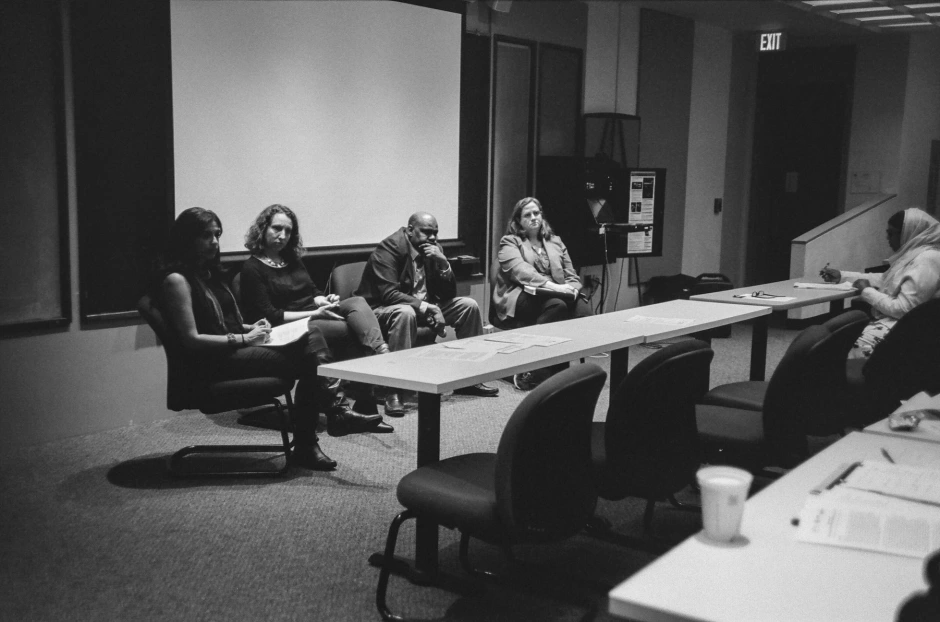
During February, Lesley University and Brandeis University in Massachusetts hosted events to elevate the conversation and build awareness on the topic of FGC as it occurs in the U.S. and the larger global world. On Feb 12th, Lesley University hosted Examining the Intersection Between Tradition and Gender Violence. The event showcased a screening of A Pinch of Skin, a documentary on FGC in India by Priya Goswami, followed by a panel discussion moderated by Mariya Taher with speakers attorney Joanne Golden, community health leader Abdirahman Yusuf, and OBGYN Dr. Melody Eckardt. Panel speakers shared their perspectives on FGC, drawing on their personal experiences with survivors across their multiple cross-cultural and professional fields to bring attention to this often silenced issue. To read more about the event, click here. Additionally, on Feb 14th, The Heller School for Social Policy and Management at Brandeis University hosted a conversation with Mariya Taher on “How Storytelling can Change Social norms, and Help to End Female Genital Cutting.” To learn more about the event, visit ‘A Pinch of Skin’ Documentary Screening and Discussion.
દાઉદી બોહરા મહિલાઓ માટે ‘સહિયો’એ યોજ્યો દ્વિતીય ‘થાલ પે ચર્ચા’ કાર્યક્રમ
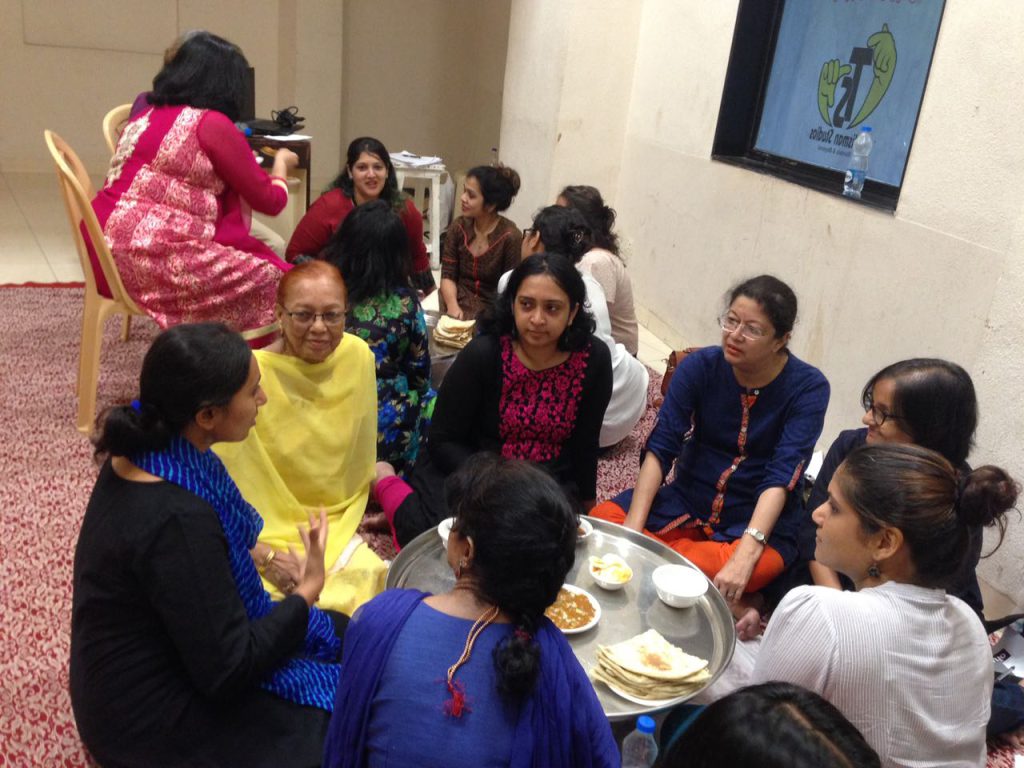
ગત પહેલી જુલાઈએ ‘સહિયો’એ તેનો દ્વિતીય ‘થાલ પે ચર્ચા’ કાર્યક્રમ યોજ્યો હતો. દાઉદી બોહરા સમુદાયની ૨૦ મહિલાઓએ આ કાર્યક્રમમાં હાજરી આપી હતી. ‘થાલ પે ચર્ચા’નો સામાન્ય શબ્દોમાં ‘ભોજન કરવાની સાથોસાથ ચર્ચા’ તરીકે થાય છે. ‘સહિયો’નો આ ફ્લેગશિપ કાર્યક્રમ છે, જેમાં બોહરા મહિલાઓને ખાનગી, અનૌપચારિક વાતાવરણમાં ભેગી કરાય છે, જેથી તેઓ ભોજન કરતી વખતે એકબીજાની સાથે સંબંધ બાંધે અને FGC (ફિમેલ જેનિટલ કટિંગ) અથવા ખત્ના/ખફઝ જેવી તેમના જીવનને અસર કરતી સમસ્યાઓની ચર્ચા કરી શકે. ‘સહિયો’નો પ્રથમ ‘થાલ પે ચર્ચા’ કાર્યક્રમ ફેબ્રુઆરીમાં યોજાયો હતો અને તેમાં વીસ અને ત્રીસ વર્ષથી મોટી વયની મહિલાઓએ હાજરી આપી હતી. આ વખતના કાર્યક્રમમાં તમામ વય જૂથોની મહિલાઓએ હાજરી આપી હતી, જેમાં સૌથી યુવાન મહિલા ૧૮ વર્ષની હતી જ્યારે સૌથી જઈફ ૭૪ વર્ષના હતા. આ મહિલાઓમાં વિદ્યાર્થિનીઓ, નોકરિયાત વ્યવસાયીઓ, ગૃહિણીઓ તથા એક પ્રૅક્ટિસિંગ ડૉક્ટરનો પણ સમાવેશ થતો હતો. આ ઉદારવૃત્તિ ધરાવતાં મિશ્રણો, દાઉદી બોહરા સમુદાયમાં પ્રવર્તમાન અતિ-ચર્ચિત ખત્ના પ્રથા વિશે, વિભિન્ન વસ્તીઓ ફરતે મહિલાઓની વિચાર પ્રક્રિયાઓનો તાગ મેળવવાની ‘સહિયો’ને તક પૂરી પાડી હતી. પરિચય કરાવનારા સત્રની સાથે આ કાર્યક્રમ શરૂ થયો હતો અને ત્યાર બાદ પ્રિયા ગોસ્વામીની ફિલ્મ ‘એ પિન્ચ ઑફ સ્કિન’ દર્શાવાઈ હતી. સ્વાદિષ્ટ, પરંપરાગત થાળ ભોજન પીરસાયું હતું અને ખત્ના વિશે મહિલાઓના વિચારોની ખુલ્લા મંચ (ઓપન કોરમ)ની ચર્ચા યોજાઈ હતી. આ સદીઓ જૂની પરંપરાના પોતાના અનુભવો વિશે વાત કરતી વખતે મહિલાઓને ભાવુક બનેલી જોઈને હિંમત સાંપડી હતી. અમુક મહિલાઓએ તેમની દીકરીઓની ખત્ના કરાવવા બદલ અફસોસ વ્યક્ત કર્યો હતો. અન્ય મહિલાઓએ જણાવ્યું હતું કે જો તેમને પસંદગી કરવાની તક મળે તો, આ અત્યંત દુઃખદાયક રીવાજ અને તેના લાભ અને ગેરલાભ વિશે કેળવણી પામવાનું તેમને ગમશે અને કદાચ તેમની પુત્રીઓની ખત્ના કરાવવાથી તેઓ દૂર રહેશે. આ કાર્યક્રમનું મુખ્ય આકર્ષણ નિશ્ર્ચિત્તપણે ૭૪ વર્ષીય વૃદ્ધા હતાં જેમણે તેમની પુત્રીની ખત્ના થવા નહીં દે, એવું સુનિશ્ર્ચિત્ત કરવા વર્ષો અગાઉ પરંપરાઓને પડકારી હતી. (This report was originally published in English on August 16, 2017. Read the English version here.)
Sahiyo hosts its second Thaal Pe Charcha event for Bohra women

On July 1, Sahiyo conducted its second ‘Thaal Pe Charcha’ event which was attended by 20 women from the Dawoodi Bohra community. Thaal Pe Charcha (TPC), which loosely translates as “having discussions while eating food”, is a flagship Sahiyo programme where Bohra women are brought together in a private, informal setting so that they can bond over food and discuss issues that affect their lives, like FGC or Khatna. Sahiyo’s first TPC was held in February with women in their 20s and 30s. This time, participants included women from all age groups, the youngest being 18 and the oldest 74 years of age. The women included students, working professionals, home-makers, and also a practicing doctor. This eclectic mix gave Sahiyo an opportunity to gauge the thought processes of women across different demographics, on the much-debated practice of Khatna within the Dawoodi Bohra community. The event was kicked off with an introductory session, followed by a film screening of Priya Goswami’s ‘A Pinch of Skin’, a delicious, traditional thaal lunch, and an open forum for women to discuss their thoughts about Khatna. It was heartening to see the women get emotional while speaking about their experiences of this age-old tradition. Some expressed regret at having done Khatna on their daughters. Others said that if given a choice, they would want to be educated about this ritual, its pros and cons, and perhaps refrain from doing it to their daughters. The highlight of this event was definitely the oldest participant, a 74-year-old woman who defied traditions years ago to ensure that her daughter was not cut. To view more pictures from Thaal Pe Charcha, check out our Facebook Album. Read the Gujarati version here.
Deen and Duniya (Religion and the World) a film by Alisha Bhagat
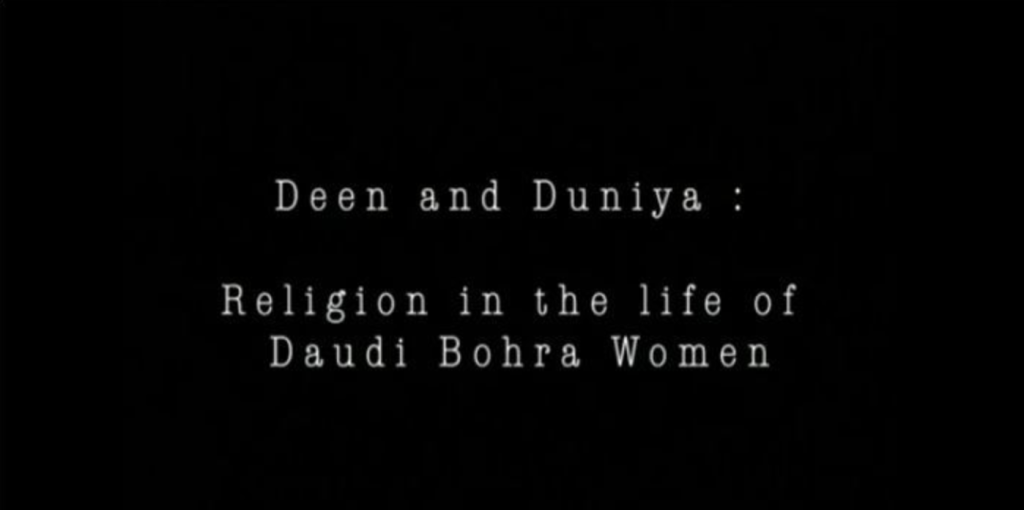
By Alisha Bhagat Country: United States & India I made Deen and Duniya in 2004 before my senior year in college. I received a Vira Heinz grant for women in leadership and thought it would be interesting to turn an anthropological lens on my own community – the Dawoodi Bohras. I am particularly interested in the role of women in the Bohra community and wanted to better understand certain dilemmas I saw while growing up in the community. When I sat down with people one-on-one while making this documentary, I found I was able to connect with them more and find out their logic for observing certain practices – be that science or faith. The film is intended for a wide audience both inside and outside the community. For non-Bohras I wanted to show the positive things about our community and the everyday joy that we experience in things like sports, prayer, communal meals and family. I also wanted to highlight some of the issues that all women in patriarchal societies face – control over women’s sexuality, bodily autonomy, and the dual burden of work and running a household. I did not set out to make a film about FGM but I knew from the beginning that it should be included. (To watch the video click here.) It is both a wonderful and frustrating time to be a Bohra woman. As the film highlights, we are given so many opportunities for achieving educational and career goals. We are quick to adopt new technology and want to live in the modern world. At the same time, we are often required to shoulder a greater burden than men. We have to work hard in our careers and also cook and clean and raise children. We have a lengthy Iddat (mourning) period that men don’t have, and are silenced from talking about the things happening to our bodies. I recall knowing from an early age that my father and brother were circumcised but it was only after I went to college that my mom revealed to me that she had been also. I found it so interesting that a practice so widespread was so taboo. Storytelling can be a powerful tool in creating social change. For example, a group of researchers in Sudan found that entertaining films can change attitudes and reduce gender bias. For those within the community, the purpose of the film is to start a conversation about why we observe certain practices. I’m proud that it can continue to do that. For years my parents used to show the film to every bohra guest that came over to our house (and I can assure you, that’s a lot). In the film we intentionally ask open-ended questions and the views of the interviewees are their own. Often after seeing the film, folks would share their own stories. My hope is that the film inspires you to do the same. The segment on FGM begins at the 19 min mark. However, it is recommended that the film be viewed in its entirety to understand the practice within its cultural context. Bio:Alisha Bhagat is passionate about sustainable development. She is a futurist, feminist, and avid gamer. She lives in New York with her husband, beloved daughter, and adorable kitty.
Sahiyo participates in kick-off event for Women’s March in Frankfurt, Germany
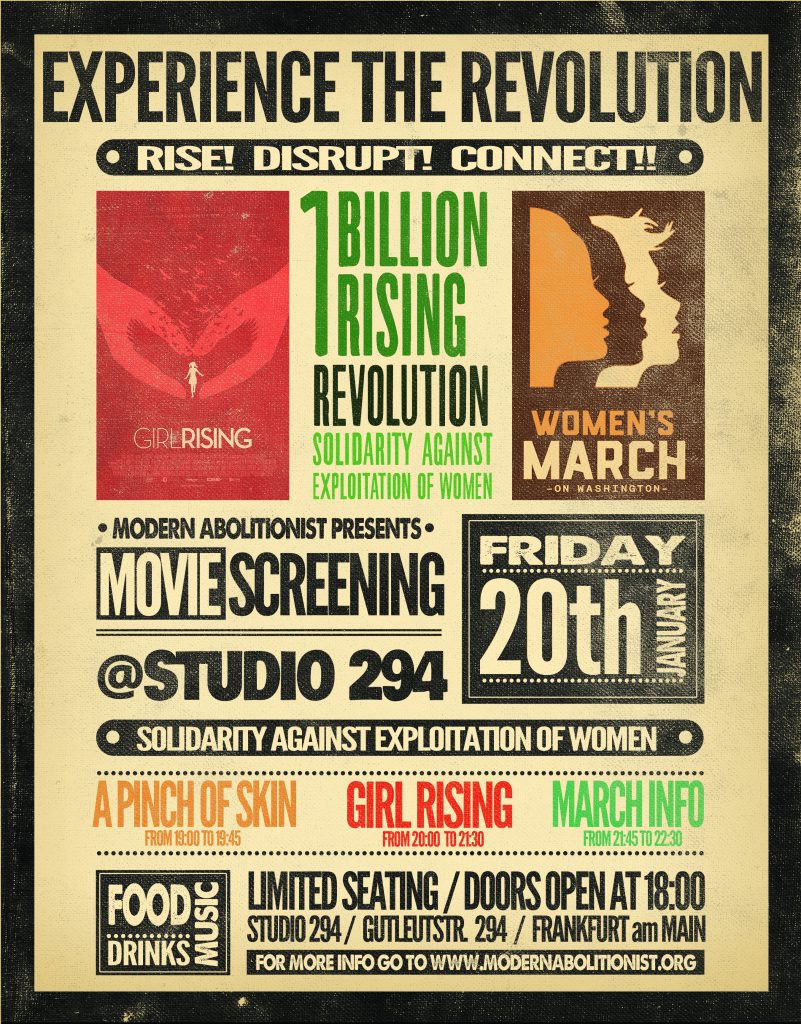
On January 20th, the Modern Abolitionist Global Campaign will start a two day campaign, with a kick -off event that will be a screening of movies dealing with gender violence and discrimination against women. The following day, on January 21st, the Modern Abolitionist Global Campaign will hold the Frankfurt Women’s March on Washington. Sahiyo will support the kick-off event, in which there will be a screening of A Pinch of Skin, a documentary produced by Sahiyo’s co-founder Priya Goswami, on the topic of female genital cutting in the Dawoodi Bohra community. During the event, Sahiyo co-founders will be be joining via Skype for a Q&A session with audience members. The documentary, Girl Rising, about the importance of educating girls to break the cycle of poverty will also be screened. To learn more, contact the organizers here.
A Short Film on FGCThe Good Girl- Written and Directed by Insia Dariwala
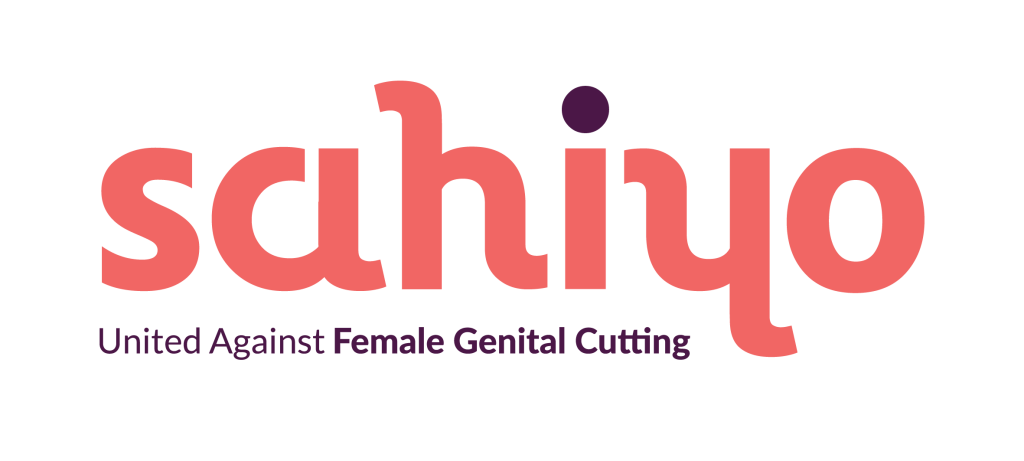
Arva was a young girl who just wanted to go to the park and enjoy a beautiful, bright morning with her aunt. Instead, she was taken to a dark room, her legs spread apart and her voice smothered, while a sharp razor cut off the ‘sinful’ part between her legs. Arva was only seven. Today, 32 year old Arva is an esteemed gynaecologist, helping other women respect their bodies, despite the fact that she struggles with accepting her own. For the past 25 years, Arva has desperately tried to heal herself from the scars given to her by the women she trusted.”But is it so easy to unknot yourself from the people and traditions that are deemed to be the essence of your identity? Watch this space to learn more about ‘The Good Girl’ written and directed by Sahiyo Co-founder Insia Dariwala. A gut-wrenching short film that peels the layers surrounding the barbaric practice of Female Genital Circumcision, when Arva comes face to face with her cutter. The woman she used to lovingly call, Faiji. Coming soon! If you have questions about the ‘The Good Girl”, please e-mail info@sahiyo.com.
